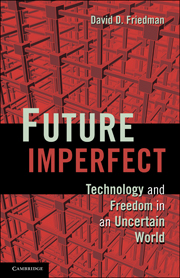Book contents
- Frontmatter
- Contents
- PART ONE PROLOGUE
- PART TWO PRIVACY AND TECHNOLOGY
- PART THREE DOING BUSINESS ONLINE
- 6 Ecash
- 7 Contracts in Cyberspace
- 8 Watermarks and Barbed Wire
- 9 Reactionary Progress – Amateur Scholars and Open Source
- 10 Intermission: What's a Meta Phor?
- PART FOUR CRIME AND CONTROL
- PART FIVE BIOTECHNOLOGIES
- PART SIX THE REAL SCIENCE FICTION
- Notes
- Bibliography
- Index
9 - Reactionary Progress – Amateur Scholars and Open Source
Published online by Cambridge University Press: 18 August 2009
- Frontmatter
- Contents
- PART ONE PROLOGUE
- PART TWO PRIVACY AND TECHNOLOGY
- PART THREE DOING BUSINESS ONLINE
- 6 Ecash
- 7 Contracts in Cyberspace
- 8 Watermarks and Barbed Wire
- 9 Reactionary Progress – Amateur Scholars and Open Source
- 10 Intermission: What's a Meta Phor?
- PART FOUR CRIME AND CONTROL
- PART FIVE BIOTECHNOLOGIES
- PART SIX THE REAL SCIENCE FICTION
- Notes
- Bibliography
- Index
Summary
A list of the half dozen most important figures in the early history of economics would have to include David Ricardo; it might well include Thomas Malthus and John Stuart Mill. A similar list for geology would include William Smith and James Hutton. For biology it would surely include Charles Darwin and Gregor Mendel, for physics Isaac Newton.
Who were they? Malthus and Darwin were clergymen, Mendel a monk, Smith a mining engineer, Hutton a gentleman farmer, Mill a clerk and writer, Ricardo a retired stock market prodigy. Of the names I have listed, only Newton was a university professor – and by the time he became a professor he had already come up with both calculus and the theory of gravitation.
There were important intellectual figures in the seventeenth, eighteenth, and early nineteenth centuries who were professional academics – Adam Smith, for example. But a large number, probably a majority, were amateurs. In the twentieth century, on the other hand, most of the major figures in all branches of scholarship have been professional academics. Most started their careers with a conventional course of university education, typically leading to a Ph.D. degree.
Why did things change? One possible answer is the enormous increase in knowledge. When fields were new, most scholars did not need access to vast libraries. There were not many people in the field, the rate of progress was not very rapid, so letters and occasional meetings provided adequate communication.
- Type
- Chapter
- Information
- Future ImperfectTechnology and Freedom in an Uncertain World, pp. 123 - 143Publisher: Cambridge University PressPrint publication year: 2008



